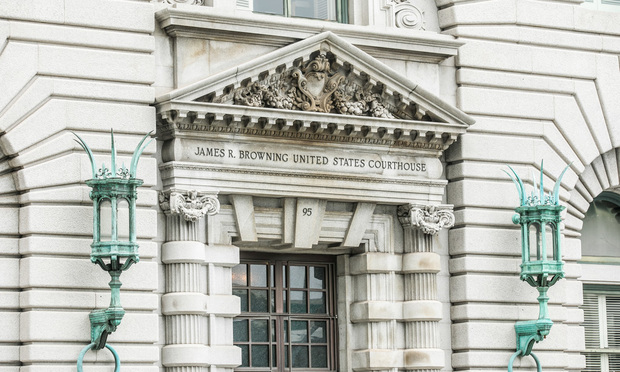Ninth Circuit Deals Blow to Koch Brothers' Nonprofit
A conservative nonprofit organization must hand over the names of its top contributors to the California attorney general, a federal appeals court ruled Tuesday in a legal blow for the group's founders, brothers Charles and David Koch.
September 11, 2018 at 04:56 PM
3 minute read
 U.S. Court of Appeals for the Ninth Circuit. Photo Credit: Jason Doiy/ALM.
U.S. Court of Appeals for the Ninth Circuit. Photo Credit: Jason Doiy/ALM.
A conservative nonprofit organization must hand over the names of its top contributors to the California attorney general, a federal appeals court ruled Tuesday in a legal blow for the group's founders, brothers Charles and David Koch.
A three-judge panel for the U.S. Court of Appeals for the Ninth Circuit unanimously sided against the Americans for Prosperity Foundation in its challenge to the California attorney general's disclosure requirement, collecting the names and addresses of the largest donors to the group. The nonprofit—which was founded in 2004 and has tea party ties—along with a number of other groups, had claimed the requirement burdened their First Amendment right to free association by deterring possible contributors.
U.S. District Judge Manuel Real of the Central District of California issued a permanent injunction in 2016, blocking the state from demanding that information.
The panel vacated the trial court's injunction Tuesday, finding the attorney general had a state interest in collecting the information to prevent charitable fraud, and would not make the information public, with few exceptions.
“We hold that the California attorney general's Schedule B requirement, which obligates charities to submit the very information they already file each year with the IRS, survives exacting scrutiny as applied to the plaintiffs because it is substantially related to an important state interest in policing charitable fraud,” said the 41-page opinion, written by Judge Raymond Fisher.
Fisher was joined by Judges Richard Paez and Jacqueline Nguyen.
In their ruling, the judges said the state only collected donor information for nonpublic use.
“The risk of inadvertent disclosure of any Schedule B information in the future is small, and the risk of inadvertent disclosure of the plaintiffs' Schedule B information in particular is smaller still. To the extent the district court found otherwise, that finding was clearly erroneous,” the panel said.
In a statement, a spokesman for the Americans for Prosperity Foundation said they would seek further review.
“We are disappointed by the Ninth Circuit's latest decision and believe it imperils people's First Amendment right to freedom of speech and of association,” the statement said. “Consistent with the protected, sensitive nature of our donors' identities, the threat and chill they face from disclosure that was established during the trial of this case, and a demonstrated pattern of misuse of Schedule B information by California officials, the foundation intends to continue doing all it can to champion and protect the important constitutional rights at stake.”
“We remain gratified by the outpouring of amicus support from groups across the spectrum and hope these and other groups will continue to express their views in court as we seek further review,” it added.
Xavier Becerra, California's attorney general, weighed in Tuesday: “By law, California requires the collection of major donor information. The reason is simple: our mission is to protect Californians who donate their hard-earned dollars to charity. Charities operating in California must not engage in fraud or unfair business practices,” Becerra said in a statement.
The Thomas More Law Center, a Michigan-based group that says on its website it “defends and promotes America's Judeo-Christian heritage and moral values,” also lost its challenge to California's donor disclosure rule Tuesday.
Quinn Emanuel Urquhart & Sullivan represented the Americans For Prosperity Foundation before the Ninth Circuit, with Washington D.C.-based partner Derek Shaffer arguing on behalf of the plaintiffs.
This content has been archived. It is available through our partners, LexisNexis® and Bloomberg Law.
To view this content, please continue to their sites.
Not a Lexis Subscriber?
Subscribe Now
Not a Bloomberg Law Subscriber?
Subscribe Now
NOT FOR REPRINT
© 2025 ALM Global, LLC, All Rights Reserved. Request academic re-use from www.copyright.com. All other uses, submit a request to [email protected]. For more information visit Asset & Logo Licensing.
You Might Like
View All
Buchalter Hires Longtime Sheppard Mullin Real Estate Partner as Practice Chair

Reality TV Couple and Pacific Palisades Neighbors Sue City of Los Angeles Over Loss of Homes to Fire
3 minute read
In Resolved Lawsuit, Jim Walden Alleged 'Retaliatory' Silencing by X of His Personal Social Media Account

No Two Wildfires Alike: Lawyers Take Different Legal Strategies in California
5 minute readTrending Stories
- 1Learning From Experience: The Best and Worst of Years Past
- 2Treasury GC Returns to Davis Polk to Co-Chair White-Collar Defense and Investigations Practice
- 3Decision of the Day: JFK to Paris Stowaway's Bail Revocation Explained
- 4Doug Emhoff, Husband of Former VP Harris, Lands at Willkie
- 5LexisNexis Announces Public Availability of Personalized AI Assistant Protégé
Who Got The Work
J. Brugh Lower of Gibbons has entered an appearance for industrial equipment supplier Devco Corporation in a pending trademark infringement lawsuit. The suit, accusing the defendant of selling knock-off Graco products, was filed Dec. 18 in New Jersey District Court by Rivkin Radler on behalf of Graco Inc. and Graco Minnesota. The case, assigned to U.S. District Judge Zahid N. Quraishi, is 3:24-cv-11294, Graco Inc. et al v. Devco Corporation.
Who Got The Work
Rebecca Maller-Stein and Kent A. Yalowitz of Arnold & Porter Kaye Scholer have entered their appearances for Hanaco Venture Capital and its executives, Lior Prosor and David Frankel, in a pending securities lawsuit. The action, filed on Dec. 24 in New York Southern District Court by Zell, Aron & Co. on behalf of Goldeneye Advisors, accuses the defendants of negligently and fraudulently managing the plaintiff's $1 million investment. The case, assigned to U.S. District Judge Vernon S. Broderick, is 1:24-cv-09918, Goldeneye Advisors, LLC v. Hanaco Venture Capital, Ltd. et al.
Who Got The Work
Attorneys from A&O Shearman has stepped in as defense counsel for Toronto-Dominion Bank and other defendants in a pending securities class action. The suit, filed Dec. 11 in New York Southern District Court by Bleichmar Fonti & Auld, accuses the defendants of concealing the bank's 'pervasive' deficiencies in regards to its compliance with the Bank Secrecy Act and the quality of its anti-money laundering controls. The case, assigned to U.S. District Judge Arun Subramanian, is 1:24-cv-09445, Gonzalez v. The Toronto-Dominion Bank et al.
Who Got The Work
Crown Castle International, a Pennsylvania company providing shared communications infrastructure, has turned to Luke D. Wolf of Gordon Rees Scully Mansukhani to fend off a pending breach-of-contract lawsuit. The court action, filed Nov. 25 in Michigan Eastern District Court by Hooper Hathaway PC on behalf of The Town Residences LLC, accuses Crown Castle of failing to transfer approximately $30,000 in utility payments from T-Mobile in breach of a roof-top lease and assignment agreement. The case, assigned to U.S. District Judge Susan K. Declercq, is 2:24-cv-13131, The Town Residences LLC v. T-Mobile US, Inc. et al.
Who Got The Work
Wilfred P. Coronato and Daniel M. Schwartz of McCarter & English have stepped in as defense counsel to Electrolux Home Products Inc. in a pending product liability lawsuit. The court action, filed Nov. 26 in New York Eastern District Court by Poulos Lopiccolo PC and Nagel Rice LLP on behalf of David Stern, alleges that the defendant's refrigerators’ drawers and shelving repeatedly break and fall apart within months after purchase. The case, assigned to U.S. District Judge Joan M. Azrack, is 2:24-cv-08204, Stern v. Electrolux Home Products, Inc.
Featured Firms
Law Offices of Gary Martin Hays & Associates, P.C.
(470) 294-1674
Law Offices of Mark E. Salomone
(857) 444-6468
Smith & Hassler
(713) 739-1250






